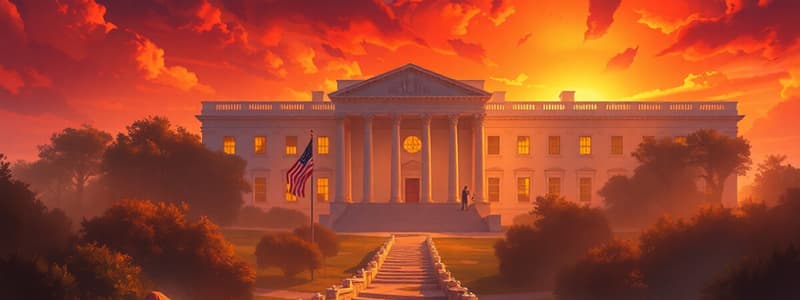Podcast
Questions and Answers
Which of the following is NOT a requirement to be eligible for the presidency?
Which of the following is NOT a requirement to be eligible for the presidency?
- Must have been a member of Congress (correct)
- Must be a natural born citizen
- Must reside in the US for at least 14 years
- Must be at least 35 years old
What role does the President play in the approval process of ambassadors?
What role does the President play in the approval process of ambassadors?
- The Supreme Court reviews and approves their appointments
- The President appoints them without any approval
- Congress must approve them through a majority vote
- The Senate confirms them after nomination (correct)
Which power does the President possess to influence legislation directly?
Which power does the President possess to influence legislation directly?
- To veto laws passed by Congress (correct)
- To draft bills for Congressional approval
- To create laws independently
- To amend the Constitution unilaterally
In a situation where Congress is not in session, what action can the President take?
In a situation where Congress is not in session, what action can the President take?
Which of the following statements about executive orders is true?
Which of the following statements about executive orders is true?
What is one primary role of the Vice President in the Senate?
What is one primary role of the Vice President in the Senate?
Which of the following statements is NOT true regarding the Vice President's role?
Which of the following statements is NOT true regarding the Vice President's role?
In what situation does the Vice President typically participate in voting within the Senate?
In what situation does the Vice President typically participate in voting within the Senate?
What might the notes about 'Group', 'Dates', and 'Activities' indicate regarding the Vice President's role?
What might the notes about 'Group', 'Dates', and 'Activities' indicate regarding the Vice President's role?
Which function does the Vice President NOT fulfill in relation to the Senate?
Which function does the Vice President NOT fulfill in relation to the Senate?
Why might the handwriting of notes about the Vice President's role be difficult to read?
Why might the handwriting of notes about the Vice President's role be difficult to read?
Flashcards are hidden until you start studying
Study Notes
Executive Branch
- The President of the United States is head of the Executive Branch and is responsible for carrying out laws passed by Congress.
- The Executive Branch is structured with 15 Departments and over 400 federal agencies.
- The Vice President is a key figure in the Executive Branch.
- The Vice President steps in if needed and can break a tie in the Senate by voting.
- The President must be at least 35 years old, a natural-born citizen, and have lived in the US for at least 14 years.
- The President is elected by the Electoral College.
- The President can influence policies through executive orders, which do not need approval from Congress.
- The President nominates ambassadors, Supreme Court justices, and members of the cabinet.
- The Senate approves presidential nominations for ambassadors.
- The President can commit the military temporarily if Congress is not in session.
- Congress has the power to declare war, but the President is the Commander-in-Chief of the Armed Forces.
Other Information
- Senators must have lived in the United States for at least 14 years.
- Congress is responsible for carrying out laws.
Studying That Suits You
Use AI to generate personalized quizzes and flashcards to suit your learning preferences.




